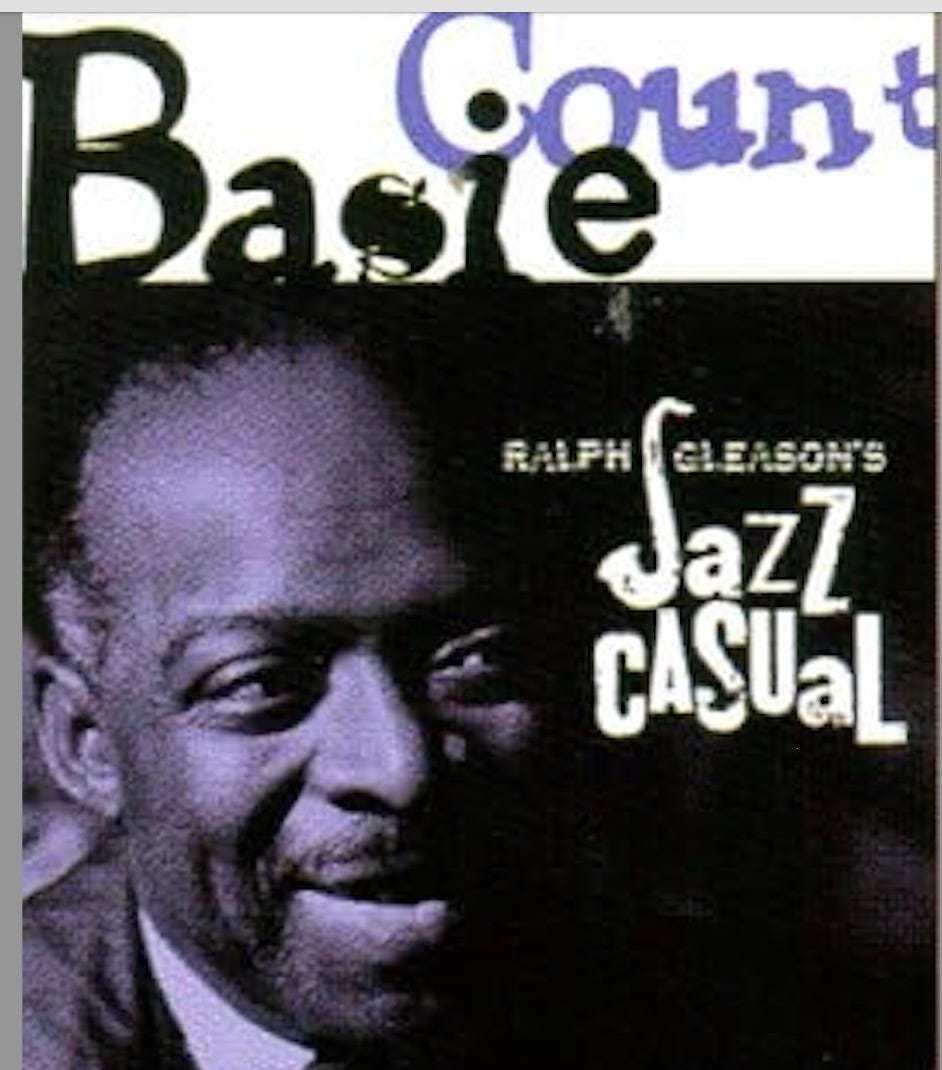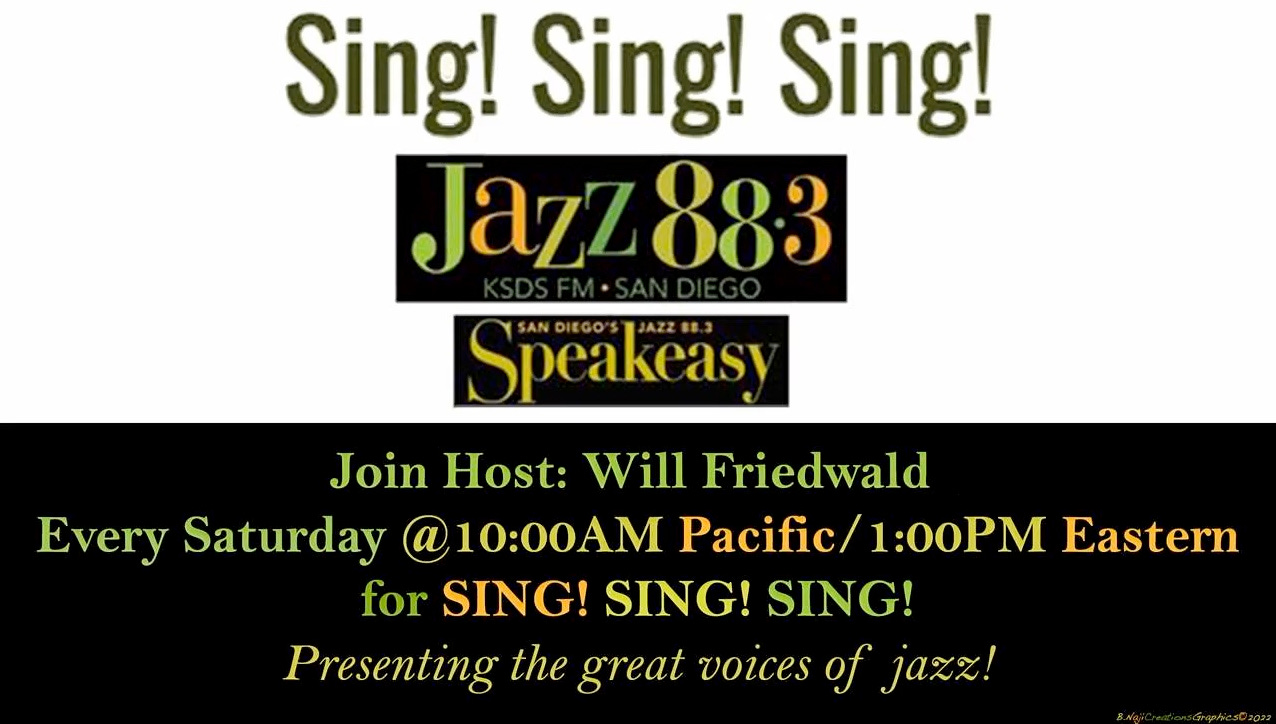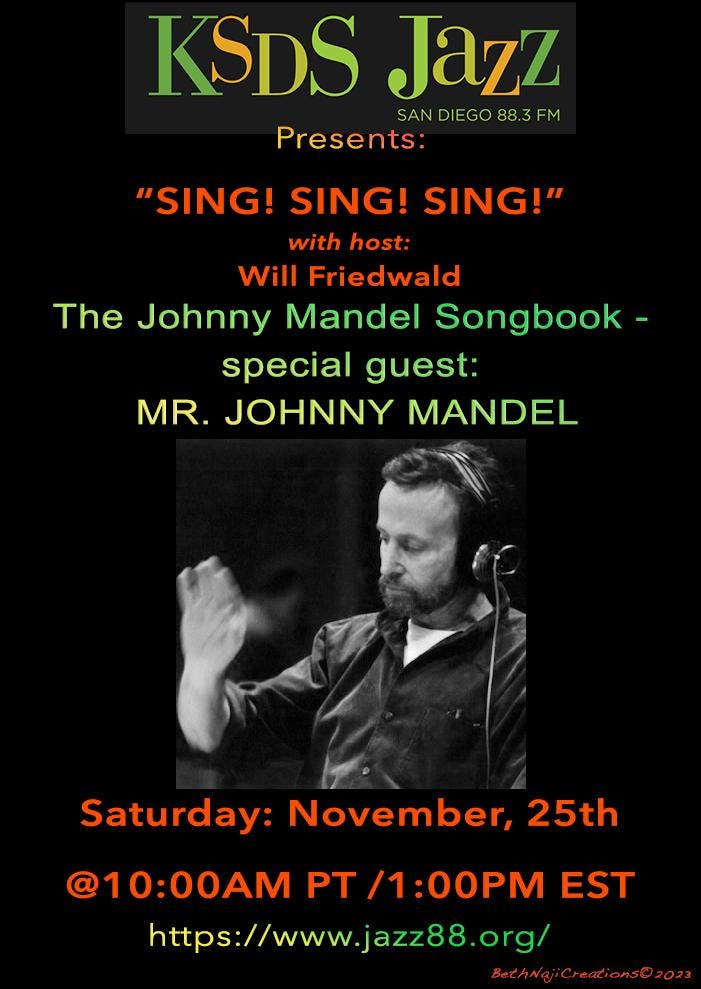continued from part 1 (yesterday):
Gleason then asks about one of the most famous and frequently-played 12-bar blues numbers in the Count’s history, his theme song of the previous 30 years, “One O’Clock Jump.”
“Well, this happened in Kansas City while we were broadcasting from the Reno Club. In those years, you didn't have to program a number. You could just play anything that you'd like to play, and it would be perfectly okay. [...] Each Sunday night, we used to have a two-hour broadcast and we would sort of run out of tunes. I guess we must have had about a half hour and we'd light out and play one, and the announcer would ask, ‘What's the name of that?’ And we'd say, ‘Well that's bing-bing-bing.’ Then we’d do another one. ‘What's the name of that?’ ‘That's so-and-so." So now we still got about 15 minutes left. And so I just started something in there and then we went to D flat for a solo. And so he said, ‘You have a title for that?’ Once I looked at the clock was about 10 minutes to one, so I said, ‘Yeah, that’s the ‘One O'Clock Jump.’" And it sort of stuck because the guys remembered it, more than the rest of the things that they were doing and it stayed there.” Basie adds that it hasn’t changed much over the years, but that “I think everybody else has got a better arrangement than we do on it really, actually,” referring to so-called cover versions and variations by the likes of Benny Goodman and Harry James.
Gleason next asks why he plays so few piano features with his own orchestra, and Basie offers one of his more thoughtful responses. “Time marches, Ralph. See, that's just the reason why, in those years, I invented this” - at which he plays three notes reminiscent of the famous Basie tag - “because I knew there was going to be days when guys were going to have me running all over this piano,” in other words, just to keep up with them. “And so I just did a little something, which I hope would sort of identify us. So, as far as I'm concerned, my piano playing is sort of dated and I'm just in the rhythm section. Which I'm very happy about, that the guys will allow me in there. And that's as far as my piano playing will go.”
Basie feels like he’s been talking too much, so he quickly launches into another improvised blues, which he spontaneously titles, in the tradition of the “One O’Clock Jump,” “20 Minutes After Three.” This piece again demonstrates the interplay between Basie and the guitar, bass, and drums. Together, Green and Keenan lay down the beat, and Basie is already improvising variations even while he’s barely had a chance to lay down a single 12-bar chorus. At different points, the trio behind sounds like they’re outlining a boogie-woogie pattern, but played much more slowly and more danceably than a fast boogie. Basie plays whisper soft at parts, laying down a three-note pattern that he repeats several times, each time landing on a different third note.
Gleason asks Basie about how he chooses tempos. “Oh, I don't know. I guess it's trying to make it easy on myself, possibly. But I do dig something that is sort of in a mood where you can pat your foot, if possible. And I think it's easy to listen to too, really. I sort of like to simplify things, which is the only way that I can do it. But even if I really could play a lot of piano, I would try to simplify it for myself because this is the type of thing I like. Although I like to listen to the giants and the fast ones, like Pete Johnson, Oscar Peterson, and all those guys. But this is me. This is what I like. I like tempos that are danceable.”
“I like tempos that are danceable”
“You started as a drummer?”
Basie’s answer involves that other great jazz musician from his own hometown of Red Bank, New Jersey, Sonny Greer, who had served as Duke Ellington’s drummer for most of the band’s great years. “Yes, but I was discouraged by the wonderful gentleman who was with the master, Edward Ellington’s band, Sonny Greer. And when we were back home, I used to have my little gigs, little piano gigs, and I'd try to sort of switch to the drums because of course that was my first love. And that in that intermission, Sonny would fall in from Long Branch somewhere and sit down on them drums. And that was all for me for the evening. So I said, ‘This is not for me, this is going to happen all my life!’ So that sort of turned me back to the piano.”
“Is the blues as much fun to play after all these years?”
“Oh yes, Ralph. I can never get tired of playing the blues or listening to the blues. As a matter of fact, if I start to make an original thing, I mean, it's always based on the blues. And to me, the blues is a starting of an awful lot of things.” At this point, surprisingly, instead of playing another full-on blues, he essays a delightfully spare, minimal - and unfortunately very brief - rendition of “As Long as I Live,” a somewhat blues-inflected popular song by Harold Arlen.
“As Long As I Live”
“You've heard so much good music back over those years, any particular things stand out?”
Basie clarifies,”As far as any band is concerned?” and then answers, “Yes. It still will linger with me is, of course, you know just what I'm going to say and who I'm going to say it to. And it's from, I think, the Dean of all, that's Edward Ellington. It’s a little thing called ‘Warm Valley.’ I shall never forget that. Of course, I shall never forget this band, because I think this man is just the end of everything. Duke's been going back for 20 years” - although both Gleason and Basie were well aware it was over 40 years by 1967 - “and ain't nobody got near him yet.”
We would love for Basie to try his hand at Ellington’s “Warm Valley,” but instead he treats us to a single chorus of a 1926 jazz standard “If I Could Be with You (One Hour Tonight)” by James P. Johnson, another iconic stride piano master. Like the other standards on this show, it’s only a minute long and far too brief. Basie sort of hums or sings along, but you have to listen closely to hear it.
“A little birthday music”
Gleason claims not to be aware of how much time has passed, but he then suggests that Basie and company conclude the program with something that they will agree to call “late birthday afternoon educational TV blues.” This is a slightly faster 12-bar blues to end on, with Basie once again playing as little as possible, his piano notes serving more as a guideline for telling Green, Keenan, and Payne where to play, even as they would likewise serve as a marking point for instructing dancers and to when to put their feet down, if, indeed, there were any dancers. Basie and the rhythm section continue to play even as the credits scroll across the screen.
“A Conversation with Count Basie,” as this episode of Jazz Casual, was titled, is a remarkable example of Basie doing two things he almost never did, featuring himself at the piano and talking. It emphasizes what we already knew, that Basie might be the only major pianist in jazz who didn’t play like he was being paid by the note.
Very Special thanks to the fabulous Ms. Elizabeth Zimmer, for expert proofreading of this page, and scanning for typos, mistakes, and other assorted boo-boos!
Coming soon: the epic, 12-part history of GORDON JENKINS’S MANHATTAN TOWER!
Sing! Sing! Sing! : My tagline is, “Celebrating the great jazz - and jazz-adjacent - singers, as well as the composers, lyricists, arrangers, soloists, and sidemen, who help to make them great.”
A production of KSDS heard Saturdays at 10:00 AM Pacific; 1:00PM Eastern.
To listen to KSDS via the internet (current and recent shows are available for streaming.) click here.
The whole series is also listenable on Podbean.com, click here.
Click here to listen to the latest episode of Sing! Sing! Sing :
“A JOHNNY MANDEL SONGBOOK Featuring MR. JOHNNY MANDEL (1925-2020)”
SLOUCHING TOWARDS BIRDLAND is a subStack newsletter by Will Friedwald. The best way to support my work is with a paid subscription, for which I am asking either $5 a month or $50 per year. Thank you for considering. Word up, peace out, go forth and sin no more!
Note to friends: a lot of you respond to my SubStack posts here directly to me via eMail. It’s actually a lot more beneficial to me if you go to the SubStack web p
age and put your responses down as a “comment.” This helps me “drive traffic” and all that other social media stuff. If you look a tiny bit down from this text, you will see three buttons, one of which is “comment.” Just hit that one, hey. Thanks!






The liner notes of Basie's "Complete Decca Recordings" indicate that the original title of "One O'Clock Jump" was "Blue Balls", and the change had to do with that latter phrase not being clean enough to be uttered on radio broadcasts of the time.
What a great article...